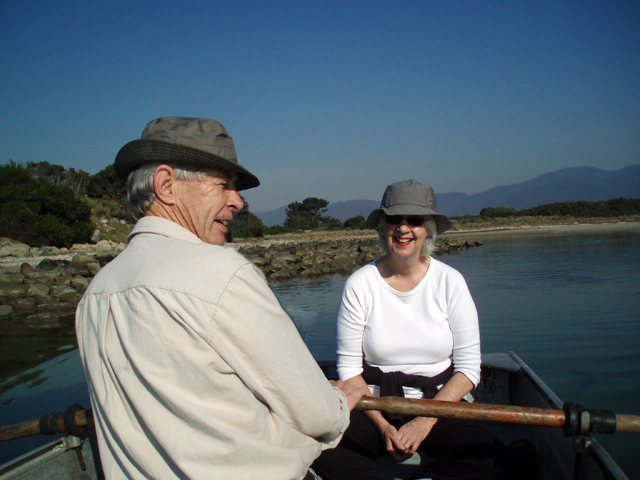Politics can chew you up and spit you out – or it can be the springboard for a whole new life.

Andrew and Amanda Lohrey on the water near their home on Tasmania’s east coast.
Here’s some sage advice for embattled politicians: if you don’t want to finish up bitter and twisted, stop thinking of politics as a career. Instead, treat it as a social contribution of limited duration.
Take Andrew Lohrey. He might have lived a life of resentment after his pioneering effort to save Tasmania’s southwest wilderness went unrecognised, but not a bit of it. Instead he took a very different path, an immense intellectual task that continues to enrich his life to this day.
After completing year 9 at St Marys Area School he was in turn a carpenter, a grape picker, a miner, a stockman and a painter on the Sydney Harbour Bridge, back when Paul Hogan was doing the same thing. All the while he was pondering something deeper – the human mind.
After working as a counsellor he returned to Tasmania to complete a degree with a psychology major in 1970, but politics beckoned. Elected as a member for Lyons (then named Wilmot), he served in successive Labor governments from 1972 to 1981.
As environment minister he got into trouble by asking too many awkward questions about the business of hydro and forestry, and was dropped from the ministry in 1979. After a stint as Speaker of the House of Assembly, he returned to Cabinet in 1981 as national parks minister.
Over six frantic months in that year, Lohrey presided over creation of the South-West National Park and then initiated the process to have Tasmania’s contiguous western wilderness parks awarded World Heritage status.
It took three months, raising the issue every week, for Lohrey to get the proposal through an argumentative Cabinet. Premier Doug Lowe sent it to then-PM Malcolm Fraser, then a month later he sacked Lohrey for commenting publicly on matters outside his portfolio.
Keen to build conservation credentials ahead of a federal election, Fraser approved the nomination and sent it to UNESCO in Paris. Then newly-elected premier Robin Gray, ignoring Fraser’s move, sent in the bulldozers to start construction of the Gordon-below-Franklin dam.
But the World Heritage nomination hung over the project like a cloud. In December 1982, while conservation groups were organising a blockade of watercraft to stop barges carrying earthmoving equipment to the dam site, southwest Tasmania was declared World Heritage property.
In support of the World Heritage listing Lohrey joined the blockade. He was arrested and for a few hours held in Risdon Prison – the only sitting Tasmanian politician to be jailed over the blockade.
The next year Bob Hawke’s new federal government argued in the High Court that the dam project breached Australia’s World Heritage obligations. The court agreed, and its verdict stopped the dam cold. Lohrey’s long stand in support of the southwest wilderness was finally vindicated.
But just keeping a parliamentary seat warm was not his idea of a career. Heeding colleagues’ advice that effective political life has its limits, he left politics for good in 1986 to resume his passion, psychology. Which is where his interesting life gets even more interesting.
Practical people keen to make their mark on the world find it hard to understand why inner lives are so important to some people. To them, whatever moves people to object to wilderness dams or coal mines or ocean pollution can be a complete mystery.
But to Lohrey, it is all utterly fascinating. After leaving politics he went to Berkeley, California, to study semantics, before completing a doctoral study with the University of Technology, Sydney on the infinite complexities and interplay of meaning, consciousness, language and science.
His advanced studies landed him consultancies as a forensic linguist analysing court evidence to ascertain truth and authorship. His work was instrumental in demonstrating that key evidence in the notorious 1978 Sydney Hilton bombing case was false.
Lohrey developed and expanded his theories in multiple publications over succeeding decades, including his doctoral thesis, The Meaning of Consciousness (1997), and his latest, The Evolution of Consciousness: a new science, about to be published by ICRL at Princeton University.
These books enter a place that we have all sensed at various points in our lives but not even begun to articulate. In Lohrey’s analysis, patterns become clearer, threads begin to join, and our integral relationship with the universe starts to make sense.
Lohrey draws on multiple sources of wisdom, in psychology and philosophy, spiritualism and religion, but he is at pains to point out that his is not a religious journey. His quest to understand the universe falls firmly within the Western intellectual tradition.
As the subtitle of his latest work suggests, he is pursuing a new science. It looks at many of the phenomena that inform quantum physics and accepts many of its findings, but it also recognises the limitation of science’s reductive method, instead seeking a more holistic understanding.
Lohrey’s life has been enriched by his partnership of over 40 years with Amanda Lohrey, a past winner of the Patrick White Award for her significant contribution to Australian literature. Her classic 1984 novel The Morality of Gentlemen was based on a famous Tasmanian waterfront dispute in the late 1950s.
